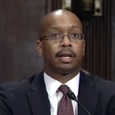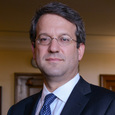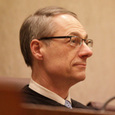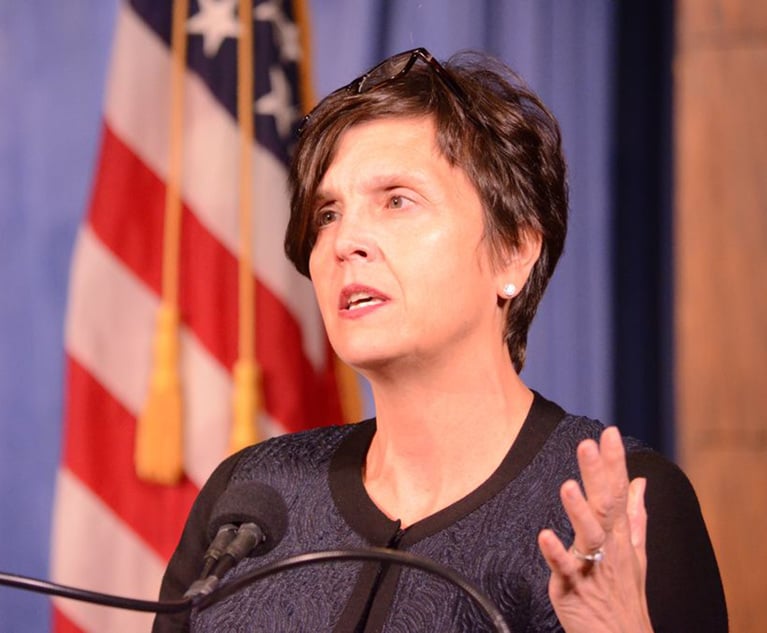Meet the 3 Judges Who've Checked Trump's Census Citizenship Question
All three judges—in California, Maryland and New York—are now weighing issues tied to the Justice Department's attempt to swap in new attorneys.
July 11, 2019 at 02:16 PM
7 minute read
The original version of this story was published on Law.com
 People demonstrate outside the U.S. Supreme Court on the day of arguments in the census case United States Department of Commerce v. New York on April 23. Photo: Diego M. Radzinschi/ALM
People demonstrate outside the U.S. Supreme Court on the day of arguments in the census case United States Department of Commerce v. New York on April 23. Photo: Diego M. Radzinschi/ALM
Three federal judges in the span of days found themselves in headlines for stopping, at least for now, the U.S. Justice Department from installing a new set of lawyers to advance the Trump administration's quest to put a citizenship question on the 2020 census.
All three judges—in California, Maryland and New York—had earlier blocked the government from adding the question, and each judge is now weighing issues tied to the Justice Department's attempt to swap in new attorneys. The maneuvering comes after the U.S. Supreme Court ruled against Trump, and after the June 30 deadline that the Justice Department claimed it needed to meet in order to finalize printing plans for the upcoming census.
President Donald Trump was expected Thursday afternoon to issue an executive order as an attempt to bypass the Supreme Court's decision. U.S. Attorney General William Barr will be at the Rose Garden for the announcement, the Justice Department said.
Any executive order is sure to face an immediate legal challenge. “This will not go unanswered,” said Dale Ho, director of the American Civil Liberties Union's voting rights project and a lead attorney in the New York case challenging the census citizenship question.
Here's a look at the three judges—Richard Seeborg in California, George Hazel in Maryland and Jesse Furman in New York—who are overseeing census litigation.
George Hazel, Long-Suffering Knicks Fan
 Judge George Hazel
Judge George HazelGeorge Hazel of the U.S. District Court for the District of Maryland was formerly Baltimore's second-in-command prosecutor before joining Maryland's federal trial bench in 2014. Between 2005 and 2010, he was a federal prosecutor first in the District of Columbia and later in Greenbelt, Maryland, where he now has court chambers. Hazel was a litigation associate at Weil, Gotshal & Manges in Washington from 1999 to 2004. His practice focused on general commercial litigation, including class action antitrust, contracts and mass torts.
“During my time at Weil, I was an active participant in our pro-bono program,” Hazel told U.S. senators at the time of his nomination. He said his pro-bono activities included “representing a Cameroon woman seeking asylum in the United States and an individual in a civil rights action against a local police department based on allegations of police brutality.”
Asked during his confirmation proceedings what judicially enforceable limits exist on the ability of presidents to issue executive orders, Hazel responded: “The Supreme Court has held that the president's authority to issue executive orders or take executive actions must be derived from either an act of Congress or the Constitution.”
Hazel revealed in court recently—in the citizenship case he is overseeing—that he's on social media. “I don't know how many federal judges have Twitter accounts, but I happen to be one of them, and I follow the president,” Hazel said. The New York native, who was 38 at the time of his nomination to the federal trial court, has tweeted regularly about the Knicks professional basketball team. Some tweets carried the ubiquitous sad-face emoji. Hazel is a 1999 graduate of the Georgetown University Law Center.
Jesse Furman, Souter Clerk and Lunch Planner
 Judge Jesse Furman
Judge Jesse FurmanJesse Furman of the U.S. District Court for the Southern District of New York was the first federal judge to strike down the Trump administration's decision to ask about citizenship on the 2020 U.S. Census. Furman issued the decision in January after a two-week trial over the decision two months prior. The census case is Furman's most high-profile decision to date.
Furman, who is overseeing an EEOC charge against Perkins Coie and handled a faulty ignition switch MDL against General Motors, took the bench in the Southern District after being nominated by President Barack Obama in 2011. He was confirmed by the U.S. Senate about eight months later. He's not unfamiliar with the Southern District; Furman was an assistant U.S. attorney there for two separate stints ranging from 2004 to 2007, then again from 2009 until his nomination to the bench. He was counselor to U.S. Attorney General Alberto Gonzales in the intervening years.
Furman graduated from Yale Law School in 1998 and went on to clerked for Judge José Cabranes of the U.S. Court of Appeals for the Second Circuit. He also clerk for U.S. Supreme Court Associate Justice David Souter for a year, then was an associate at Wiggin & Dana in Connecticut before becoming a federal prosecutor. On the federal trial bench, Furman has organized Thursday lunches among newly appointed judges and their senior colleagues.
Richard Seeborg, Adjunct Prof and Morrison & Foerster Alum
 Judge Richard Seeborg
Judge Richard SeeborgRichard Seeborg of the U.S. District Court for the Northern District of California has issued two high-profile rulings blocking the president's 2019 policy goals, including the census citizenship question. In March, Seeborg called the administration's attempt to add the question “arbitrary and capricious” in a 126-page ruling. Then, a little more than a month later, Seeborg issued a preliminary injunction blocking the Trump Administration's efforts to require asylum seekers to wait in Mexico as the U.S. processes their cases.
In 2009, Seeborg became the first of 11 judges President Barack Obama nominated to the Northern District of California. Before his time on the district bench, he served as a U.S. magistrate judge. He practiced at Morrison & Foerster as an associate and then partner focusing on general commercial, intellectual property, securities and antitrust litigation before holding the position of assistant U.S. attorney in the Northern District of California from 1991 to 1998. He also clerked for John H. Pratt of the U.S. District Court for the District of Columbia after graduating from Columbia Law School in 1981.
Seeborg is set to step into the role of chief judge of the Northern District of California after Judge Phyllis Hamilton completes her term in 2022.
Seeborg was an adjunct professor at Santa Clara University School of Law prior to joining the federal bench, according to his Senate questionnaire. He taught a federal criminal litigation course that focused on the development and defense of federal criminal cases, including during the initial investigation, trial and sentencing.
Read more:
Two More Federal Judges Question DOJ's Census Case Maneuvering
Here's the DOJ Team Leading Trump's 11th Hour Census Litigation
Trump Hasn't Surrendered on Citizenship Question, DOJ Tells Judge
'Regrettable.' 'First Time Ever.' 'Inventing.' How Justices Fumed Over Census Ruling
Roberts, Ruling Against Trump, Faces New Round of Conservatives' Criticism
This content has been archived. It is available through our partners, LexisNexis® and Bloomberg Law.
To view this content, please continue to their sites.
Not a Lexis Subscriber?
Subscribe Now
Not a Bloomberg Law Subscriber?
Subscribe Now
NOT FOR REPRINT
© 2025 ALM Global, LLC, All Rights Reserved. Request academic re-use from www.copyright.com. All other uses, submit a request to [email protected]. For more information visit Asset & Logo Licensing.
You Might Like
View All
Skadden and Steptoe, Defending Amex GBT, Blasts Biden DOJ's Antitrust Lawsuit Over Merger Proposal
4 minute read
'Lack of Independence' or 'Tethered to the Law'? Witnesses Speak on Bondi
4 minute read
Trending Stories
Who Got The Work
J. Brugh Lower of Gibbons has entered an appearance for industrial equipment supplier Devco Corporation in a pending trademark infringement lawsuit. The suit, accusing the defendant of selling knock-off Graco products, was filed Dec. 18 in New Jersey District Court by Rivkin Radler on behalf of Graco Inc. and Graco Minnesota. The case, assigned to U.S. District Judge Zahid N. Quraishi, is 3:24-cv-11294, Graco Inc. et al v. Devco Corporation.
Who Got The Work
Rebecca Maller-Stein and Kent A. Yalowitz of Arnold & Porter Kaye Scholer have entered their appearances for Hanaco Venture Capital and its executives, Lior Prosor and David Frankel, in a pending securities lawsuit. The action, filed on Dec. 24 in New York Southern District Court by Zell, Aron & Co. on behalf of Goldeneye Advisors, accuses the defendants of negligently and fraudulently managing the plaintiff's $1 million investment. The case, assigned to U.S. District Judge Vernon S. Broderick, is 1:24-cv-09918, Goldeneye Advisors, LLC v. Hanaco Venture Capital, Ltd. et al.
Who Got The Work
Attorneys from A&O Shearman has stepped in as defense counsel for Toronto-Dominion Bank and other defendants in a pending securities class action. The suit, filed Dec. 11 in New York Southern District Court by Bleichmar Fonti & Auld, accuses the defendants of concealing the bank's 'pervasive' deficiencies in regards to its compliance with the Bank Secrecy Act and the quality of its anti-money laundering controls. The case, assigned to U.S. District Judge Arun Subramanian, is 1:24-cv-09445, Gonzalez v. The Toronto-Dominion Bank et al.
Who Got The Work
Crown Castle International, a Pennsylvania company providing shared communications infrastructure, has turned to Luke D. Wolf of Gordon Rees Scully Mansukhani to fend off a pending breach-of-contract lawsuit. The court action, filed Nov. 25 in Michigan Eastern District Court by Hooper Hathaway PC on behalf of The Town Residences LLC, accuses Crown Castle of failing to transfer approximately $30,000 in utility payments from T-Mobile in breach of a roof-top lease and assignment agreement. The case, assigned to U.S. District Judge Susan K. Declercq, is 2:24-cv-13131, The Town Residences LLC v. T-Mobile US, Inc. et al.
Who Got The Work
Wilfred P. Coronato and Daniel M. Schwartz of McCarter & English have stepped in as defense counsel to Electrolux Home Products Inc. in a pending product liability lawsuit. The court action, filed Nov. 26 in New York Eastern District Court by Poulos Lopiccolo PC and Nagel Rice LLP on behalf of David Stern, alleges that the defendant's refrigerators’ drawers and shelving repeatedly break and fall apart within months after purchase. The case, assigned to U.S. District Judge Joan M. Azrack, is 2:24-cv-08204, Stern v. Electrolux Home Products, Inc.
Featured Firms
Law Offices of Gary Martin Hays & Associates, P.C.
(470) 294-1674
Law Offices of Mark E. Salomone
(857) 444-6468
Smith & Hassler
(713) 739-1250











